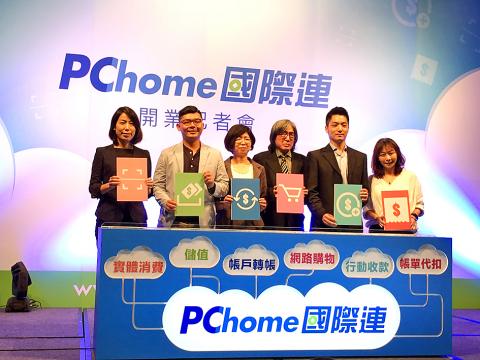PChome InterPay (國際連), a wholly owned subsidiary of PChomePay (支付連), yesterday launched a third-party payment and online financing service.
PChome InterPay, with a paid-in capital of NT$501 million (US$15.88 million), said that its service would allow tens of millions of customers within subsidiaries of PChome Online Inc (網路家庭) to directly store money and make transactions with third-party payment accounts instead of using credit cards or bank accounts.
The company said in a statement that it would introduce the service to 8.8 million users at PChome subsidiary Ruten.com (露天拍賣) and expand its customer base to include PChome’s other subsidiaries — such as PChome Store Inc (商店街市集) — in the near future.

Photo: CNA
“E-commerce business in Taiwan has great potential, but the legal framework [for third-party payments] was not fully established until last year,” PChome chairman Jan Hung-tze (詹宏志) told a news conference in Taipei, referring to the legislature’s approval of amendments to the Electronics Payment Processing Institutions Act (電子支付機構管理條例).
Jan said that previously there were too many restrictions on online payment services, which had slowed the expansion of local e-commerce firms.
Former Financial Supervisory Commission chairman Chen Yuh-chang (陳裕璋) had been remiss in 2013 when he refused to allow non-financial companies to offer online payment services at a time when the practice had become common in China and many other nations.
“China’s Alipay (支付寶) has provided online payment services for 12 years, while Taiwanese companies are only being allowed to develop online payment services now,” Jan said.
In addition, more than 90 percent of people using PChome’s auction platform are amateur sellers, Jan said, adding that they need a more convenient way to do business and transfer money.
Moreover, third-party payment services could also help build up a big database for analyzing consumer behavior on the Internet, he said.
“Companies could use transaction data to assess buyers’ and sellers’ credit scores to develop better services,” Jan said.
E-commerce transactions on all PChome subsidiaries totaled about NT$200 billion per year, he said, citing company statistics.
Asked whether PChome InterPay would cooperate with other online stores or platforms like PayPal, Jan said that the firm has no such plans at the moment.
“We will focus on our existing customers first,” Jan said. “It took almost 30 years to make credit cards a common payment tool in Taiwan and there is still a long way to go” for third-party payment services.

To many, Tatu City on the outskirts of Nairobi looks like a success. The first city entirely built by a private company to be operational in east Africa, with about 25,000 people living and working there, it accounts for about two-thirds of all foreign investment in Kenya. Its low-tax status has attracted more than 100 businesses including Heineken, coffee brand Dormans, and the biggest call-center and cold-chain transport firms in the region. However, to some local politicians, Tatu City has looked more like a target for extortion. A parade of governors have demanded land worth millions of dollars in exchange

An Indonesian animated movie is smashing regional box office records and could be set for wider success as it prepares to open beyond the Southeast Asian archipelago’s silver screens. Jumbo — a film based on the adventures of main character, Don, a large orphaned Indonesian boy facing bullying at school — last month became the highest-grossing Southeast Asian animated film, raking in more than US$8 million. Released at the end of March to coincide with the Eid holidays after the Islamic fasting month of Ramadan, the movie has hit 8 million ticket sales, the third-highest in Indonesian cinema history, Film

Taiwan Semiconductor Manufacturing Co’s (TSMC, 台積電) revenue jumped 48 percent last month, underscoring how electronics firms scrambled to acquire essential components before global tariffs took effect. The main chipmaker for Apple Inc and Nvidia Corp reported monthly sales of NT$349.6 billion (US$11.6 billion). That compares with the average analysts’ estimate for a 38 percent rise in second-quarter revenue. US President Donald Trump’s trade war is prompting economists to retool GDP forecasts worldwide, casting doubt over the outlook for everything from iPhone demand to computing and datacenter construction. However, TSMC — a barometer for global tech spending given its central role in the

Alchip Technologies Ltd (世芯), an application-specific integrated circuit (ASIC) designer specializing in server chips, expects revenue to decline this year due to sagging demand for 5-nanometer artificial intelligence (AI) chips from a North America-based major customer, a company executive said yesterday. That would be the first contraction in revenue for Alchip as it has been enjoying strong revenue growth over the past few years, benefiting from cloud-service providers’ moves to reduce dependence on Nvidia Corp’s expensive AI chips by building their own AI accelerator by outsourcing chip design. The 5-nanometer chip was supposed to be a new growth engine as the lifecycle